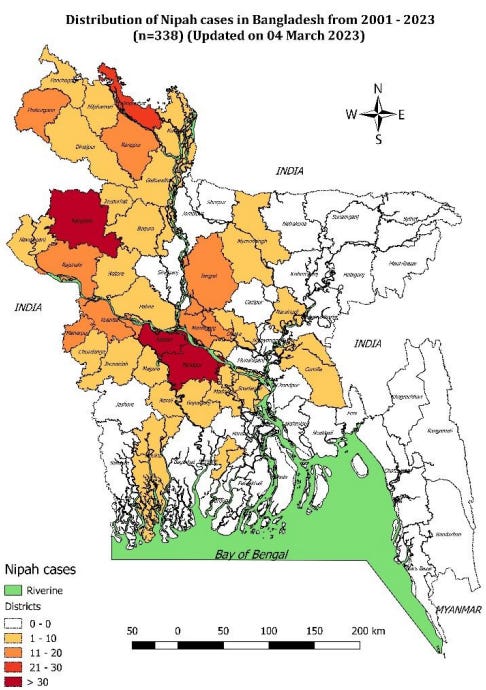Nipah virus infections 2023: 20 cases reported in Bangladesh and India
Bangladesh has unfortunately been the consistent location on the planet that reports human Nipah virus infections on a regular, annual basis. Since 2001, Bangladesh health officials have reported well more than 300 cases and 200 deaths, recording a roughly 70 percent case fatality rate.
Certain years in the country saw very high numbers of cases and deaths—for example, 2004 saw 67 cases/50 deaths and in 2011, 42 cases and 36 deaths.
Only rarely in two decades did Bangladesh not report any cases (2006 and 2016 are two examples).
Months before the outbreak in Kerala state, India last month, Bangladesh reported more than a dozen cases.
According to the Institute of Epidemiology Disease Control and Research (IEDCR) in Dhaka, from January 2023 as of 04 March 2023, a total of 14 Nipah cases and 10 deaths were identified through the surveillance system. Cases were reported from seven districts.
This is the highest number of cases since 2015 when 15 cases including 11 deaths were reported.
This outbreak is related to the consumption of date palm sap.
Then of course there is the more recent outbreak in Kerala, India. According to the World Health Organization, From the 12 to 15 September 2023, the Ministry of Health and Family Welfare, Government of India, reported six laboratory-confirmed Nipah virus cases, including two deaths, in Kozhikode district, Kerala. Aside from the first case, whose source of infection is unknown, the other cases were family and hospital contacts of the first case.
This was not the first time Kerala reported Nipah cases. This is the sixth outbreak in India since 2001 when the first outbreak was reported in Siliguri town, West Bengal (66 cases, CFR: 68%). Subsequently, five outbreaks have been reported- Nadia district, West Bengal (5 cases; CFR: 100%), Kozhikode and Malappuram, Kerala in 2018 (23 cases including confirmed and probable; CFR: 91%), Ernakulum, Kerala in 2019 (a single case who survived) and Kozhikode, Kerala in 2021 (one case, CFR: 100%).
Nipah Virus Infection : A Newly Emerging Disease
Nipah virus (NiV) is an emerging and serious viral zoonotic disease that carries with it a high case fatality rate (in the ballpark of 70% or more).
NiV is an enveloped RNA virus and along with Hendra virus make up the Henipahviruses.
The natural host of the virus are fruit bats of the Pteropodidae family, Pteropus genus.
It was first recognized in a large outbreak in Kampung Sungai Nipah, Malaysia and Singapore from Sep 1998 – May 1999.
276 cases were reported, the vast majority (93%) being pig farmers or people who had contact with pigs. The disease presented as encephalitis and four out 10 people died.
It is theorized that the pigs got infected consuming partially bat-eaten fruit that ended up in a pigsty. Pigs were the intermediate host in this case; however, subsequent outbreaks had no intermediate hosts.
No new outbreaks have been reported in Malaysia since 1999.
The outbreaks since the initial one in Malaysia (Bangladesh and India) have been linked to two possible routes of transmission—consumption of raw date palm sap that had been contaminated with urine or saliva from infected fruit bats and strong evidence points to human-to-human transmission (close physical contact, especially contact with body fluids).






